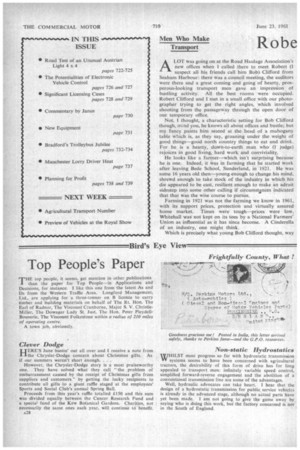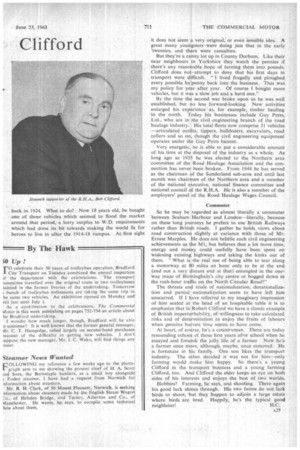Robe Clifford
Page 30

Page 31

If you've noticed an error in this article please click here to report it so we can fix it.
ALOT was going on at the Road Haulage Association's new offices when I called there to meet Robert (1 suspect all his friends call him Bob) Clifford from Seaham Harbour: there was a council meeting, the auditors were there and a great coming and going of hearty, prosperous-looking transport men gave an impression of bustling activity. All the best rooms were occupied. Robert Clifford and I met in a small office with our photographer trying to get the right angles, which involved shooting from the passageway through the open door of our temporary office.
Not, I thought, a characteristic setting for Bob Clifford though, mind you, he knows all about offices and bustle; but my fancy paints him seated at the head of a mahogany table which is, as they say, groaning under the weight of good things—good north country things to eat and drink. For he is a hearty, down-to-earth man who (I judge) rejoices in good living, hard work and conviviality.
He looks like a farmer—which isn't surprising because he is one. Indeed, it was in farming that he started work after leaving Bede School, Sunderland, in 1921. He was some 16 years old then—young enough to change his mind, shrewd enough to take stock of the industry in which his die appeared to be cast, resilient enough to make an adroit sidestep into some other calling if circumstances indicated that that was the wise course to pursue.
Farming in 1921 was not the farming we know in 1961, with its support prices, protection and virtually assured home market. Times were tough—prices were low, Whitehall was not kept on its toes by a National Farmers' Union as influential as it has since become. A Cinderella of an industry, one might think.
Which is precisely what young Bob Clifford thought, way back in 1924. What to do? Now 18 years old, he bought one of those vehicles which seemed to flood the market around that period, a lorry surplus to W,D. requirements which had done its bit towards making the world fit for heroes to live in after the 1914-18 rumpus. At first sight
it does not seem a very original, or even Sensible idea. A 'great many youngsters were doing just that in the early 'twenties, and there were casualties.
But they're a canny lot up in County Durham. Like their near neighbours in Yorkshire they watch the pennies if there's any reasonable hope of turning them into pounds. Clifford does not,atterript to deny that his first days in transport were difficult. "I lived frugally and ploughed every possible ha'penny back into the business, That was my policy for year after year. Of course I bought more vehicles, but it was a slow job and a hard one."
By the time the second war broke upon us he was well established, but no less forward-looking. New activities enlarged his experience as, for example, timber hauling In the north. Today his businesses include Guy Potts, Ltd., who are in the civil engineering branch of the road haulage industry. His total fleets now comprise 31 vehicles —articulated outfits, tippers, bulldozers, excavators, road rollers and so on, though the civil engineering equipment operates under the Guy Potts banner.
Very energetic, he is able to put a considerable amount of his time at the disposal of the industry as a whole. As long ago as 1935 he was elected to the Northern area committee of the Road Haulage Association and the connection has never been broken. From 1944 he has served as the chairman of the Sunderland sub-area and until last month was chairman of the Northern area and a member of the national executive, national finance committee and national council of the R.H.A. He is also a member of the employers' panel of the Road Haulage Wages Council.
Commuter
So he may be regarded as almost literally a commuter between Seaham Harbour and London—literally, because on these long journeys he prefers to use British Railways rather than British roads. I gather he holds views about road construction slightly at variance with those of Mr. Ernest Marples. He does not belittle such civil engineering achievements as the MI, but believes.that a lot more time, energy and money could usefully have been spent on widening existing highways and taking the kinks out of them. "What is the real use of being able to tear along a motorway at 80 miles an hour only to be at the end (and not a very distant end at that) entangled in the oneway maze of Birmingham's city centre or bogged down in the rush-hour traffic on the North Circular Road?"
The threats and trials of nationalization, denationalization and partial nationalization seem to have left him unscarred. If I have referred to my imaginary impression of him seated at the head of an hospitable table it is to emphasize that in Robert Clifford we have a classic example of British imperturbability, of willingness to take calculated risks and of determination to enjoy the fruits of labours when genuine harvest time seems to have come.
At heart, of course, he's a countryman. There are today resounding echoes of those first years after school when he essayed and forsook the jolly life of a farmer Now he's a farmer once more, although, maybe, once removed. He is fortunate in his family. One son likes the transport industry. The other decided it was not for him—only farming would make him happy. So there's a young Clifford in the transport business and a young farming Clifford, too. And Clifford the elder keeps an eye on both sides of his interests and enjoys the best of two worlds.
Hobbies? Farming, he says, and shooting. There again his good luck shines through. His two farms do not lack birds to shoot, but they happen to adjoin a large estate where birds are bred. Happily, he's the typical good
neighbour! H.C.




















































































































